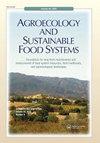Agroecology-oriented farmers’ groups. A missing level in the construction of agroecology-based local agri-food systems?
IF 2.6
3区 农林科学
Q1 AGRICULTURE, MULTIDISCIPLINARY
引用次数: 1
Abstract
ABSTRACT The efforts of agroecology-oriented farmers and peasants’ organizations have been studied in depth in relation to their political expression, but less so with regard to the forms they adopt to strengthen the socio-economic viability of small- and medium-sized farms within sustainable food systems. Whilst farmers’ self-organization represents a core process in the development of Agroecology-based Local Agri-food Systems (ALAS), the development of collective, economic structures among agroecology-oriented farmers’ is still weak. In an attempt to understand why and how agroecology-oriented farmers are constructing their own position within ALAS, and the challenges they are facing in this sense, we conducted a qualitative study on the self-organizational processes and structures of five Agroecology-Oriented Farmers’ Groups in Spain. Based on 27 interviews and six online, participatory workshops, our results reveal different reasons for joining and setting up farmers’ groups as non-mixed collective spaces, with instrumental and social factors constituting the principal motivations. Politics and advocacy aroused controversy and were only observed in the biggest, most powerful and well-structured organizations. The main challenges identified refer to the precariousness and isolation of farmers, as well as of the different local groups. The weakness of the Agroecology-Oriented Farmers’ Groups highlights the need for further action-oriented research and accompaniment以农业生态为导向的农民团体。以农业生态为基础的地方农业食品体系建设缺失的层面?
以农业生态为导向的农民和农民组织的努力已经在其政治表达方面进行了深入研究,但就他们在可持续粮食系统中为加强中小型农场的社会经济可行性而采取的形式而言,研究较少。虽然农民的自组织是生态农业为基础的地方农业粮食系统(ALAS)发展的核心过程,但生态农业为基础的农民集体经济结构的发展仍然薄弱。为了理解生态农业导向的农民为什么以及如何在ALAS中构建自己的位置,以及他们在这一意义上面临的挑战,我们对西班牙五个生态农业导向的农民团体的自组织过程和结构进行了定性研究。基于27个访谈和6个在线参与式研讨会,我们的研究结果揭示了农民加入和建立非混合集体空间的不同原因,工具因素和社会因素构成了主要动机。政治和宣传引起了争议,只有在最大、最有权力和结构良好的组织中才能观察到。所确定的主要挑战涉及农民以及不同地方群体的不稳定和孤立。以农业生态为导向的农民团体的弱点突出了进一步以行动为导向的研究和陪伴的必要性
本文章由计算机程序翻译,如有差异,请以英文原文为准。
求助全文
约1分钟内获得全文
求助全文
来源期刊

Agroecology and Sustainable Food Systems
AGRICULTURE, MULTIDISCIPLINARY-GREEN & SUSTAINABLE SCIENCE & TECHNOLOGY
CiteScore
4.80
自引率
7.70%
发文量
73
期刊介绍:
Agroecology and Sustainable Food Systems is devoted to the rapidly emerging fields of agroecology and food system sustainability. By linking scientific inquiry and productive practice with transformative social action, agroecology provides a foundation for developing the alternative food systems of the future. The journal focuses on the changes that need to occur in the design and management of our food systems in order to balance natural resource use and environmental protection with the needs of production, economic viability, food security, and the social well-being of all people.
Agroecology and Sustainable Food Systems examines our current food systems from production to consumption, and the urgent need to transition to long-term sustainability. The journal promotes the study and application of agroecology for developing alternatives to the complex problems of resource depletion, environmental degradation, a narrowing of agrobiodiversity, continued world hunger, consolidation and industrialization of the food system, climate change, and the loss of farm land. The journal uses a food systems approach, and seeks experiences in agroecology that are on-farm, participatory, change-oriented, and backed by broad-based methodologies of sustainability analysis and evaluation.
 求助内容:
求助内容: 应助结果提醒方式:
应助结果提醒方式:


